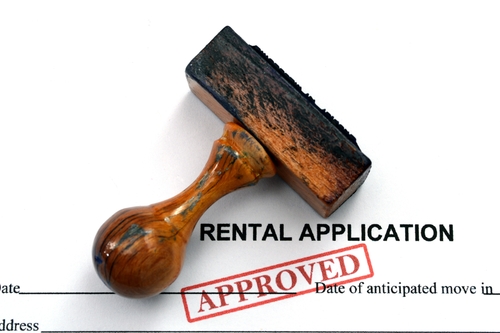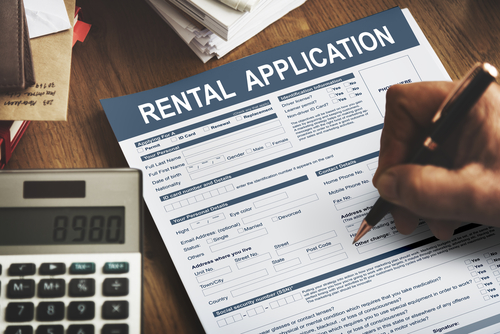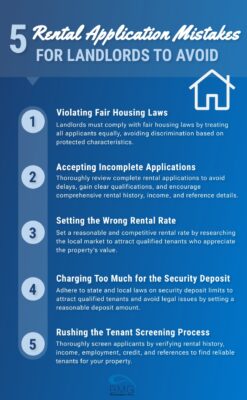The initial rental application is one of the most important forms for landlords and tenants. However, knowing what to include on the application and knowing how to evaluate each applicant’s information is a crucial step in the process. Today, we’ll go over the importance of the rental application process and rental application mistakes for landlords to avoid. Read along to learn more about evaluating the important information on a rental application.

Contents of This Article:
- Importance of the Rental Application Process
- 5 Rental Application Mistakes for Landlords to Avoid
- How to Evaluate Each Rental Application
- Avoid Rental Application Mistakes With BMG
Importance of the Rental Application Process
The rental application process is essential for landlords, tenants, and property managers in Philadelphia. After all, it serves several crucial purposes that contribute to a mutually beneficial rental experience. The application has all the vital information that landlords or property managers need to find a qualified tenant to live in a rental property.
For instance, a typical rental application includes the following information:

- Personal Information
- Rental History
- Employment and Income
- References
- Financial Information
- Pets
- Criminal History
- Reason for Moving
- Consent and Authorization for a Background Check, Credit Check, and Contacting References
- Signature and Date
You’ll want to evaluate all the information an applicant gives you to help assess whether or not they’d be a good fit for the property. For instance, looking into their income and credit history helps give you an idea of their ability to afford the rent. After all, you want to find tenants that will pay rent on time and not default on their financial obligations.
Additionally, checking their rental history and references from previous landlords gives insight into an applicant’s behavior as a tenant. Look for tenants that are known for being responsible, respectful, and cooperative.
Finally, a rental application process with clear requirements helps streamline the tenant selection process. In turn, landlords can compare applicants and choose the most suitable one. However, remember to treat each applicant equally and fairly while complying with fair housing laws.
5 Rental Application Mistakes for Landlords to Avoid
As stated before, the rental application is one of the most important rental forms that landlords and tenants need. It’s important to ensure rental applications comply with fair housing laws and contain all the information necessary to decide which tenants fit your properties best. Avoiding certain rental application mistakes can help landlords find the most qualified and responsible tenants while ensuring compliance with fair housing laws.

- Violating Fair Housing Laws
- Accepting Incomplete Applications
- Setting the Wrong Rental Rate
- Charging Too Much for the Security Deposit
- Rushing the Tenant Screening Process
Violating Fair Housing Laws
All landlords should be well-versed in fair housing laws and regulations. The Fair Housing Act prohibits discrimination against potential tenants based on protected characteristics like race, color, religion, national origin, sex, disability, or familial status. So, to comply with fair housing laws, it’s crucial to treat all applicants equally and fairly throughout the application process. For instance, avoid making decisions based on personal biases or preferences and focus on objective criteria only.
Accepting Incomplete Applications
When reviewing rental applications, ensure that each applicant fills out the form completely and provides all the required information. After all, incomplete applications can lead to delays and may not give a clear and comprehensive picture of the applicant’s qualifications. So, make the application easy to understand to reduce questions and uncertainties. Additionally, encourage applications to provide thorough details about their rental history, income, and references to help you make an informed decision.
Setting the Wrong Rental Rate
Setting a reasonable yet competitive rental rate is essential for attracting qualified tenants. Before choosing a rate, conduct thorough research on the local rental market to determine the fair market value of your property. After all, charging too much for rent can deter potential tenants, while setting it too low could raise questions about the property’s condition. However, finding the right balance will help attract tenants who appreciate your property’s value.
Charging Too Much for the Security Deposit
You’ll want to be mindful of your state and local laws around security deposit limits. For instance, high security deposits could deter qualified applicants from applying, and lead to potential legal issues if not in line with legal requirements. So, ensure your security deposit is reasonable and within the allowable limits to attract qualified, responsible tenants.
Rushing the Tenant Screening Process
Tenant screening is crucial in finding reliable and responsible tenants for your rental property. So, take time to thoroughly screen each applicant, verifying their rental history, income, employment, credit history, and references. Remember, rushing through this process may lead to overlooking important details or red flags that might impact the quality of the tenancy.
How to Evaluate Each Rental Application
Landlords should evaluate rental applications carefully and objectively to select qualified and responsible tenants for their properties. That said, here are a few steps to evaluating applications to find the right matches for your rentals.
- Review the Application- Read over the application to ensure the applicant filled out each section thoroughly and provided all the necessary information.
- Verify Identity and Background- Check the applicant’s identification documents, like their driver’s license, to confirm their identity. Additionally, perform background checks to assess criminal history and search for any potential red flags.
- Verify Income and Employment- Request documents to verify the applicant’s income and employment stability. This may include pay stubs, tax returns, or employment verification letters.

- Conduct Credit Checks- Get permission from your applicant to run a credit check. Then, you’ll want to look for a history of responsible financial behavior, timely payments, and any outstanding debts.
- Check Rental History- You’ll want to contact the applicant’s previous landlords to inquire about their rental history. Ask about their payment history, adherence to lease terms, and any past rental issues.
- Evaluate References- Contact the personal and professional references provided by the prospective applicant. These references can offer insights into the applicant’s character, reliability, and suitability as a tenant.
- Compare Applications- If you receive multiple applications, compare them against each other based on your established criteria. Avoid making decisions solely based on the first application without considering others.
- Consider Tenant Suitability- Assess how well the applicant’s lifestyle and needs align with the property. For instance, a small apartment may not be suitable for a large family or tenants with several pets.
Avoid Rental Application Mistakes With BMG
Knowing what to include and which questions to ask on a rental application is essential for landlords and property managers. After all, after reviewing a prospective tenant’s application, you want to gain insight into their ability to respect the property and pay rent on time. As such, it’s important to recognize common rental application mistakes and avoid them while choosing tenants.
Need More Advice? contact us today!
If you need help finding and screening potential tenants for your rental properties, you may benefit from professional property management. With a team of qualified property managers by your side, Bay Property Management Group can help you find and screen qualified tenants for your properties.
So, do you need comprehensive rental property management services near Baltimore, Philadelphia, Northern Virginia, or Washington, DC? Contact BMG today to learn how we can help your rental business succeed.

